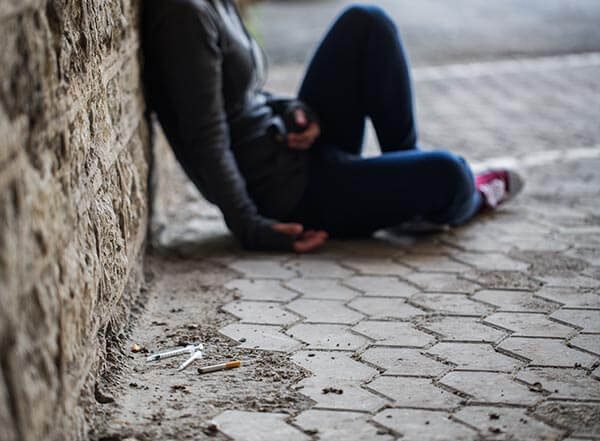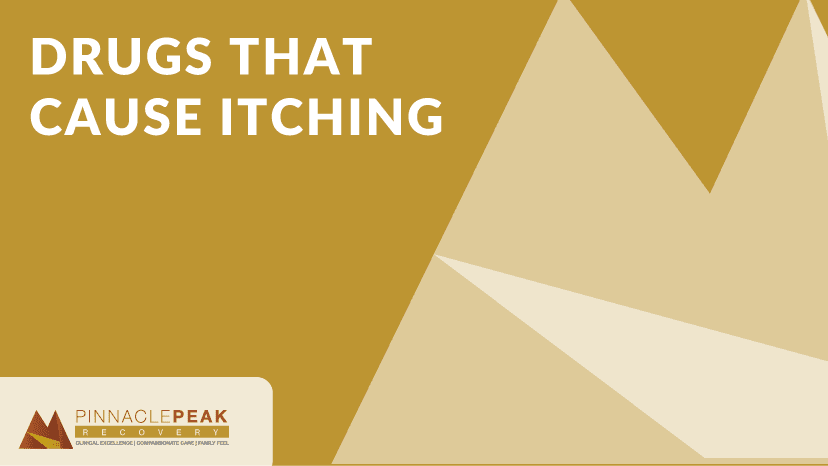Medications can cause a myriad of side effects. Some people find it comical how rapidly these side effects might be listed at the end of a commercial. When it comes to substance use and side effects, they can vary from immediate side effects to long-term developments that coincide with a substance use disorder. When thinking of side effects, some that come to mind might include nausea, headaches, insomnia, or even hallucinations, but what about itchiness? Are there drugs that cause itching?

Here at Pinnacle Peak Recovery, we know how many different side effects can occur from all forms of drug consumption. Sometimes we start to experience changes in our body, like itchiness, dry mouth, and tinnitus, and it’s not always easy to identify where it’s coming from or if it’s something we should be concerned about. To properly track your health, it helps to know more about where your symptoms may be coming from.
What Causes Drug-Related Itching?
If you’ve developed the sudden urge to itch and you can’t seem to find the source, you might be wondering why it’s happening in the first place. The desire to itch the skin, or the feeling of irritation on the skin, is called pruritus. This can be a side effect of many types of prescriptions or drugs.
Another common reason for itching in response to consuming a substance is an allergic reaction. It’s important to note that usually, an allergic reaction would come with other symptoms alongside it including, but not limited to, rashes, swelling, teary eyes, and difficulty breathing. You should contact your doctor if you’re experiencing anything severe.
How Long Does Drug-Related Itching Last?
When it comes to side effects, the length of time they’ll impact you can vary. If the side effect occurs when the substance is in your body, there’s a chance it will last until it’s out of your system. The length of time something stays within the body can vary depending on many things such as dosage, half-life, metabolism, and even what other things you had in your body when you took the substance.
If the side effect is because of long-term use, the itching could be persistent or even pop up randomly. The source of your itching can determine how long it will last. One way you can help yourself in this regard is by notating when you notice the itching and how long it lasts. If you start to notice a pattern, it can help you pinpoint the source. This information can also be helpful if you decide to seek medical advice for the itching, as you can give your doctor more specifics about when it occurs and where.
Is A Family Member In Need of Substance Use Disorder Treatment? Give Us A Call!
Where on Your Body Will Itching Occur?
Pruritus can occur on any part of your skin. Sometimes it will primarily develop in a specific area, such as the scalp or arms. It can also occur over the entire body.
If you’re experiencing itching because of an allergic reaction, the primary location of the irritation will occur in a spot that’s affected by the allergen. This is why if you encounter poison ivy, for example, the itching will occur in the spot where you got the oils onto your skin. If your allergic reaction is from something inside of you, the itching could occur across your whole body as it’s being processed through it.
Is Itching a Sign of a Substance Use Disorder?
How often is itching a sign of a substance use disorder? If you notice your loved one itching often – should you be concerned?
There could be a few reasons behind a loved one, or yourself, suddenly developing the urge to itch. If it’s tied to substance use, a few other side effects would make themselves known as well.
One such condition is known as drug-induced cholestasis. This is a condition in which the bile in your digestive system is not properly getting where it needs to be. When this occurs, it can impact the liver. One of the side effects of cholestasis is intense itching, usually on the palms of your hands or soles of your feet, but itching can occur elsewhere too.
While pruritus is not a very frequent occurrence in relation to substance use, let’s look at two instances where it may be the source.
Opioids and Itching
Over 60% of people who have used opioids for medical reasons have reported itching as a side effect. This occurs due to a triggering of the immune system. It impacts receptor proteins on the surface of white blood cells which makes them widen your blood vessels, allowing more blood to specific areas of the body. When this happens, both itching and inflammation can occur as a result as well.
Meth and Itching
It’s important to know the difference between itching and scratching at the skin. Itching comes from a desire to relieve yourself of irritation on the skin. When it comes to meth use, it’s well known that a common side effect is “meth mites.” Meth mites are a form of hallucination that often occurs as a side effect of long-term meth use. People see bugs on their skin or feel them under their skin. As a result, they then pick at their skin to try and get rid of the bugs. This could be confused with itching.
When Should You Seek Medical Attention for Itching?
If your itching is frequent and bothers you, you should seek medical attention. The frequent urge to itch the skin is not common and can be alleviated. Plus, it could be a sign of something more. In order to better help your doctor locate the source of the itching, there are some questions you should ask yourself.
- When does the itching occur?
- Where does the itching occur?
- Does itching occur after you’ve consumed something specific?
- Do you experience any other side effects besides itching?
- How long does the itching last?
Does Your Loved One Need Treatment for Substance Use Disorder?
We Are A Phone Call Away!
Getting Treatment for Substance Use Disorder
Whether you think your itching is due to substance use or you’re looking to recover from substance use regardless, Pinnacle Peak is here to help. We offer a wide range of services to help you along every step of your recovery journey, from detox and medication-assisted treatment (MAT) to inpatient and outpatient programs.
MAT programs work especially well for those looking to recover from an opioid use disorder. Utilizing FDA-approved medications like Naltrexone, we can help you as you start your path to recovery. MAT helps you manage your symptoms and cravings so you can better focus on your healing.
Inpatient and outpatient programs are both great next steps. They offer similar programming, from individual and group therapy sessions to additional, skill-building-focused programs that help bolster the things you learn in therapy. Inpatient allows you to stay on-site 24/7, giving you full access to our licensed medical staff and surrounding you with others on the same journey as you. This can be especially helpful for those who might find distractions at home, or who are transitioning from one living situation to another.
Outpatient services can be another step after inpatient or could be one of your first steps. Every patient’s journey is unique and we understand that. Outpatient still has many of the same treatment options as an inpatient but allows you to go home and not be on-site 24/7. This can be especially helpful for those who need to be with family, or who are continuing to maintain employment during recovery.
If you have any questions about our treatment programs, substance use, or anything else, feel free to give us a call at 866-377-4761. We're always happy to help.


